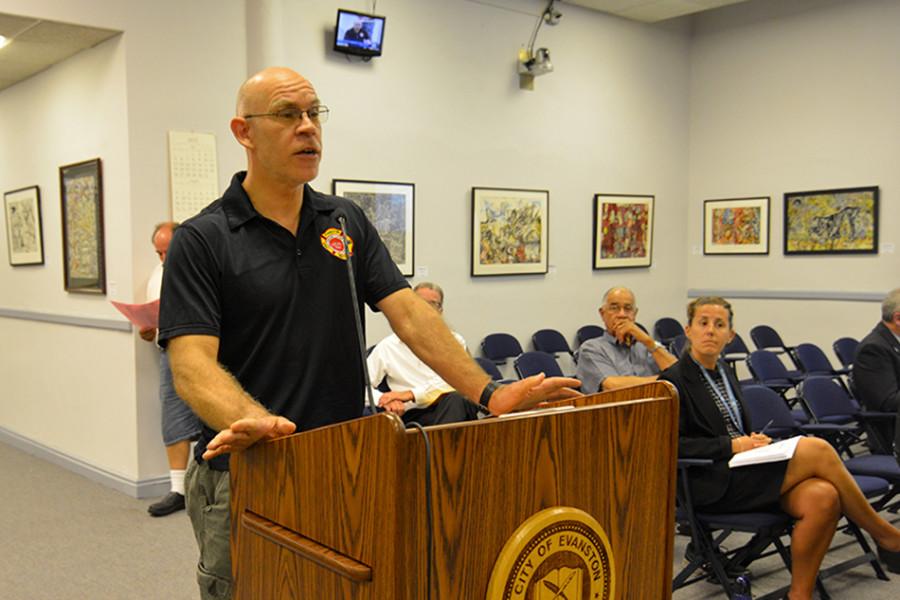Evanston City Council mulls furlough day, hiring freeze
Julia Jacobs/Daily Senior Staffer
Jason Hays, an Evanston firefighter, speaks to aldermen Monday in opposition to budget-balancing strategies that cut pay for city employees. Aldermen will consider proposed fiscal solutions, including a furlough day and a city hiring freeze, during future meetings.
August 18, 2015
Illinois Budget Crisis
Aldermen voted Monday to file away a narrowed package of solutions to reduce this year’s projected city budget deficit and manage the effect of upcoming state budget cuts, pushing a likely controversial debate to a later date.
The potential solutions include a furlough day at the end of December and a hiring freeze on all city positions effective Sept. 1 until the end of the year, city staff announced. City manager Wally Bobkiewicz and his staff proposed these solutions in part to reduce the $586,766 budget shortfall estimated for the end of 2015 as well as to preemptively balance potential state funding cuts.
Although Bobkiewicz eliminated the option of a September furlough day, the Dec. 31 furlough — in which all city employees would take unpaid leave — will move forward into planning stages.
If enacted, the hiring freeze would save the city the most money of all proposed solutions at an estimated $350,000. Although the freeze would apply to all city positions, there would be flexibility in making exceptions for vital roles, said deputy city manager Erika Storlie.
Evanston stood to lose about $3.75 million under Gov. Bruce Rauner’s initially proposed state budget. However, the size of the cuts are uncertain while the state remains stalemated in producing a long-term plan for fiscal year 2016, Bobkiewicz said.
“We’re experiencing some pressures from the state,” Storlie said. “To be proactive in light of the situation, we’re trying to be thoughtful about the kinds of suggestions that we put forward.”
The council is also slated to consider cost increases for parking tickets, seat belt citations and ambulance fees at its Aug. 31 meeting, all measures that would go into effect at the beginning of October.
Although Evanston finished its second quarter at the end of June with a general fund surplus of about $3.3 million, city staff predict a budget deficit by the end of December mostly because of major revenue losses in telecommunications taxes and building permits.
The city has been hit for the past few years by decreasing revenue from telecommunications taxes, which plummeted nearly 13 percent between 2013 and 2014 — largely due to fewer people using landline phones. To increase this revenue and to match the changing technological tide, Storlie said the city is considering taxing data plans next year.
The upcoming revenue shortfall also stems from a postponed building permit payment for Northwestern’s Lakefront Athletic and Recreation Complex. Storlie said the payment was pushed back to the beginning of next year due to extended review by the Army Corps of Engineers, contributing to a $1.2 million shortfall in this year’s building permit revenue.
While Bobkiewicz remains “cautiously optimistic” about the eventual state budget, upcoming state slashes could could sabotage the effect of these proposed measures. Despite citizen objection to fiscal solutions affecting city employees, Bobkiewicz sees the winter furlough day as a necessary measure.
“I truly believe that it will be something that we need to do this year,” Bobkiewicz said.
However, Ald. Jane Grover (7th) said she worries about the timing of a furlough day at the end of December, questioning whether it is a worthwhile solution based on its potential harm to city workers.
“I suspect it means a lot to our employees, losing a day’s wages over the holidays,” Grover said. “I’d like a different direction on this one.”
Jason Hays, an Evanston firefighter, spoke in opposition to solutions that weigh on city employees who weren’t involved in the causes for the budget deficit, such as the postponed building permit for NU’s athletic facility.
“That has nothing to do with the employees who are doing work, who are trying to make ends meet,” Hays told aldermen at the meeting. “You just can’t balance the budget on the backs of your workers alone.”
Most of these solutions, including the hiring freeze, are newly announced after Bobkiewicz introduced 10 possibilities to manage the state cuts’ effects on the city in July. After consideration by city staff, several proposed fixes were not introduced to aldermen, including a cigarette tax increase and implementation of a used car sales tax.
Email: [email protected]
Twitter: @juliarebeccaj


